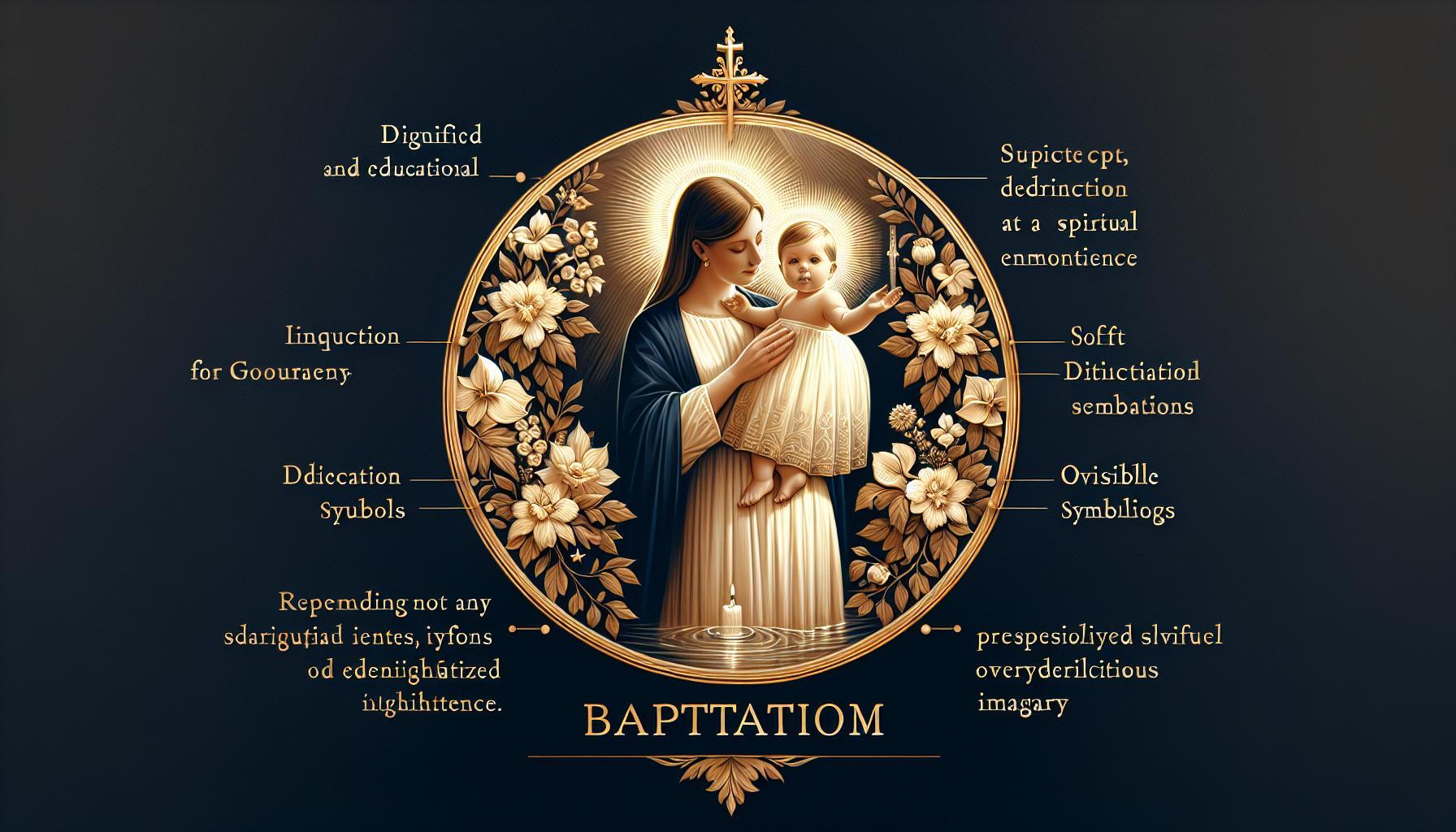The question of whether baptism is a prerequisite for salvation has sparked fervent debate among theologians and believers alike. Understanding the varying perspectives on this essential rite is crucial, as it shapes faith practices and beliefs across denominations. This article explores diverse theological views, shedding light on the significance of baptism in the journey of faith.
Understanding the Nature of Salvation: A Theological Overview
In exploring the intricate dynamics of salvation, one must grapple with the various theological interpretations that have emerged through centuries of church history. The question of whether baptism is essential to salvation is a significant topic, generating diverse perspectives across denominations and theological schools. To truly appreciate this theological terrain, it is vital to understand the multifaceted nature of salvation itself.
The Multifaceted Doctrine of Salvation
Salvation, from a theological standpoint, encompasses several core elements that interact in complex ways. These can be categorized as follows:
- Grace: Central to the understanding of salvation, grace is the unmerited favor of God towards humanity. It is through grace that individuals receive the gift of salvation, independent of works.
- Faith: Faith acts as a response to God’s grace. It is through belief in Jesus Christ and His redemptive work that believers come to exchange their sins for His righteousness.
- Baptism: This is often viewed as an outward sign of an inward transformation. While some traditions argue it is necessary for salvation, others see it more as an important, but non-essential, act of obedience.
- Repentance: Genuine repentance involves turning away from sin and redirecting one’s life towards God. This change of heart is often seen as an integral step in the process of salvation.
Understanding these components allows for a more comprehensive view of what it means to be saved. The dialogue surrounding whether baptism is essential to salvation often revolves around these elements—particularly the tension between faith and works in the salvation experience.
Examining Diverse Theological Perspectives
Diverse theological perspectives contribute significantly to the discourse surrounding baptism and its role in salvation. For instance, some denominations, like the Roman Catholics and many Orthodox Christians, emphasize the sacramental nature of baptism, viewing it as a crucial means of grace. In these traditions, baptism is seen as a necessary sacrament for the remission of sins and entry into the Christian community.
Conversely, other branches of Christianity such as many Protestant denominations argue that salvation is entirely a matter of faith. They perceive baptism as a significant, yet symbolically rather than sacramentally, meaningful act that follows an individual’s acceptance of Jesus Christ as Lord and Savior. This theological divergence raises essential questions about the nature of salvation and encourages believers to explore their understanding of faith’s role versus ecclesiastical rituals.
| Perspective | View on Baptism | Emphasis |
|---|---|---|
| Roman Catholic | Essential for salvation | Grace through sacraments |
| Protestant (Evangelical) | Important but not essential | Faith alone |
| Baptist | Public expression of faith | Believer’s baptism required |
| Orthodox | Sacrament necessary for new life | Tradition and mystery |
Ultimately, the conversations around baptism and salvation invite believers to delve deeper into their faith, examining the tension between tradition and scripture. Each theological perspective enriches the dialogue, offering valuable insights into what it truly means to experience salvation through grace, faith, and, in the case of some traditions, baptism.
The Role of Baptism in Different Christian Traditions
When exploring the significance of baptism across various Christian traditions, it becomes evident that this sacrament embodies diverse theological understandings, interpretations, and practices. Baptism, often viewed as a rite of initiation into the Christian community, holds varying implications concerning salvation and faith across denominations.
Denominational Perspectives on Baptism
- Roman Catholic Church: In Roman Catholicism, baptism is deemed essential for salvation. The catechism teaches that baptism removes the guilt of original sin and marks a person’s entry into the Church. This sacrament is believed to confer grace, making it a vital step in the journey of faith.
- Eastern Orthodox Church: Similar to Catholicism, Eastern Orthodoxy views baptism as a necessary sacrament for salvation and as part of the larger mystery of Chrismation. The act is celebrated with rich symbolism, including immersion in water, representing death and rebirth.
- Protestant Traditions: Perspectives among Protestant denominations vary widely. Some, like Lutherans and Anglicans, maintain that baptism is significant and should not be dismissed; however, they often emphasize that faith, not the act itself, is critical for salvation. In contrast, groups such as Baptists advocate for believer’s baptism, underscoring the necessity of personal faith before undergoing the sacrament.
- Non-Denominational and Evangelical Groups: Many non-denominational Christians view baptism as an important outward sign of an inward change. While it is respected, they frequently assert that it is not essential for salvation, placing a greater emphasis on a relationship with Christ.
Symbolism and Community in Baptism
Beyond the theological implications, baptism serves to enhance community bonds within the church. Common symbols associated with baptism—such as water representing purification and new life—can be seen across traditions. Various practices highlight an individual’s transition into the faith community, reinforcing unity in diversity.
| Tradition | View on Baptism | Key Symbolism |
|---|---|---|
| Roman Catholic | Essential for salvation | Repentance, grace |
| Eastern Orthodox | Necessary and sacramental | Death and resurrection |
| Lutheran | Means of grace | Sign of the covenant |
| Baptist | Not essential, requires faith | Public declaration |
Understanding these traditions enhances one’s appreciation of baptism’s multifaceted nature. Each Christian group contributes unique insights, allowing believers and seekers alike to explore what baptism means in their spiritual journey. As the conversation around whether “Is Baptism Essential to Salvation?” continues, it remains crucial for individuals to reflect on their own beliefs and traditions.
Key Biblical Passages on Baptism and Salvation
Understanding the relationship between baptism and salvation can often feel like navigating a complex maze. In the Bible, several passages provide key insights that clarify this relationship, revealing varied theological perspectives across different denominations. To fully appreciate these scriptural references, one must delve into their context and interpretative traditions.
Essential Scripture Passages
The New Testament offers numerous verses that address the themes of baptism and salvation. Here are some pivotal passages:
- Matthew 28:19-20: In the Great Commission, Jesus commands His followers to baptize all nations in the name of the Father, Son, and Holy Spirit, highlighting baptism as an essential step in the discipleship process.
- Acts 2:38: Peter addresses the crowd on the day of Pentecost, urging them to “repent and be baptized” for the forgiveness of sins, indicating a direct link between baptism and salvation.
- Romans 6:3-4: Paul elaborates on the significance of baptism, describing it as a rite of initiation into the death and resurrection of Christ, symbolizing a new life in faith.
- 1 Peter 3:21: In discussing Noah’s Ark, Peter notes that baptism now saves believers, presenting it as a reflection of an inward commitment to God.
Theological Interpretations
Different denominations interpret these verses through varied theological lenses, which can lead to differing views on the necessity of baptism for salvation.
| Denomination | View on Baptism and Salvation |
|---|---|
| Baptists | Believe that baptism is an important act of obedience that symbolizes salvation, but is not essential for it. |
| Catholics | Teach that baptism is a sacrament necessary for salvation, as it removes original sin and brings one into the Church. |
| Methodists | View baptism as a means of grace but understand salvation as primarily based on faith, with baptism following as a sign of commitment. |
| Pentecostals | Emphasize the necessity of baptism in the name of Jesus for full salvation, often linking it to the experience of the Holy Spirit. |
By exploring these biblical references and their theological implications, believers can better understand the diverse outlooks on baptism and its role within the broader conversation about salvation. Engaging with these scriptures fosters a deeper comprehension that enriches one’s faith journey and communal practice within the Church.
Historical Perspectives: The Evolution of Baptismal Theology
Throughout history, the practice of baptism has been a defining element of Christian identity and theology. Its significance transcends mere ritual, delving deep into the roots of faith and community. As questions about the role of baptism in salvation arise—such as “Is Baptism Essential to Salvation? Theological Perspectives Explained”—understanding its evolution becomes paramount to grasping contemporary views.
Early Church Understanding
In the early Christian community, baptism was inherently linked to a profound public declaration of faith. The Acts of the Apostles documents many instances where individuals were baptized soon after their acceptance of Christ, symbolizing not just personal transformation but also entry into the Christian fellowship. This initial understanding established a framework for viewing baptism as essential in the process of salvation.
- Symbol of Repentance: Early Christian baptism often reflected the Jewish practice of ritual washing, emphasizing a cleansing from sin.
- Community Involvement: Baptism was performed by apostles and early church leaders, reinforcing its theological and communal importance.
- Connection to Resurrection: The rite signifies death to sin and rebirth in Christ, as articulated in Romans 6:4.
Medieval Developments
As Christianity matured, theological interpretations of baptism expanded. The Middle Ages ushered in differing perspectives on its relationship with salvation. Contributing factors included the influential writings of church fathers and the rise of the sacramental system within the Catholic Church.
| Theological Perspective | Key Figures | Influence |
|——————————————|—————————–|————————–|
| Baptismal Regeneration | Augustine of Hippo | Linked baptism with the concept of original sin, establishing it as necessary for salvation. |
| Baptism as a Sacrament | Thomas Aquinas | Defined baptism as a means of grace, emphasizing its essential role in the salvific process. |
These developments positioned baptism as not merely a rite of passage but as a sacrament intertwined with grace and salvation, leading to the belief that it was essential for all who desired to enter the Kingdom of God.
The Reformation and Subsequent Views
The Reformation in the 16th century prompted a dramatic theological reevaluation of baptism. Reformers like Martin Luther and John Calvin recognized its significance but often contended that faith alone sufficed for salvation. This led to the emergence of differing views within Protestant denominations regarding the necessity of baptism.
- Faith Alone (Sola Fide): Luther believed that baptism was important but that it was faith that ultimately secured salvation.
- Baptism as an Outward Sign: Many Anabaptists argued that baptism should only be administered to believers, asserting that it is a public witness of inner faith rather than a means of grace.
- Calvin’s Perspective: Calvin emphasized baptism as a “seal” of God’s promise but did not affirm that it itself could guarantee salvation.
As various denominations developed their stances, the discussion on baptism’s role became more nuanced, with the question of “Is Baptism Essential to Salvation? Theological Perspectives Explained” continuing to evoke deep theological reflection and debate within contemporary Christianity. Understanding this historical journey not only enriches theological discourse but also sharpens the practice and meaning of baptism today.
Debating the Necessity: Perspectives from Various Denominations
The discussion surrounding the necessity of baptism in relation to salvation has persisted for centuries, drawing passionate responses from diverse Christian denominations. Across various theological frameworks, perspectives differ considerably, reflecting a rich tapestry of beliefs and interpretations of scripture. These divergent views can often lead to confusion for believers seeking clarity on this essential aspect of their faith.
Perspectives from Major Christian Denominations
When examining whether baptism is essential to salvation, it’s crucial to recognize the nuanced positions held by different denominations. Below is a brief overview highlighting some key perspectives:
| Denomination | View on Baptism’s Necessity | Scriptural Basis |
|---|---|---|
| Catholic | Baptism is essential for salvation; it cleanses original sin and initiates one into the Church. | John 3:5, Acts 2:38 |
| Orthodox | Similar to the Catholic view, it is seen as a sacrament necessary for salvation. | Titus 3:5, Matthew 28:19 |
| Protestant (Lutheran) | Baptism is vital but is not the sole means of salvation; faith is equally pivotal. | Ephesians 2:8-9, Mark 16:16 |
| Reformed | Baptism is a sign of God’s covenant and a necessary act of obedience, yet not mandatory for salvation. | Romans 10:9-10 |
| Evangelical | Baptism is important as a public declaration of faith but not essential for salvation. | Acts 16:31 |
This table illustrates that while some denominations emphasize the sacramental nature of baptism, making it a prerequisite for salvation, others highlight the importance of faith and personal belief as the core components of being saved. For believers navigating these waters, it may be beneficial to consider a few actionable steps:
- Study Scripture: Dive into biblical texts related to baptism and salvation to build a personal understanding.
- Engage in Dialogue: Open discussions with leaders from various denominations to explore differing interpretations.
- Attend Diverse Services: Experience the worship practices of various churches to see how they incorporate baptism and understand its significance.
Understanding the diverse perspectives on baptism and salvation can empower individuals in their faith journeys, whether they affirm its necessity or approach it differently. Each tradition holds deeply rooted beliefs shaped by history, scripture, and community, making the conversation about baptism both complex and enriching.
The Relationship Between Faith and Works in the Context of Baptism
The interplay between faith and works, especially viewed through the lens of baptism, reflects a profound theological inquiry that has intrigued scholars, theologians, and believers alike for centuries. Many argue that baptism, as an outward sign of inward grace, is not merely a ritualistic act but a critical expression of faith. This perspective aligns with the belief that true faith naturally produces works, creating a symbiotic relationship that underscores the essence of salvation. Individuals who truly embrace their faith will often feel compelled to manifest that belief through actions, such as baptism, which signifies a commitment to a new life in Christ.
Faith as the Root of Works
To understand , it is essential to emphasize that faith serves as the root from which good works spring. The New Testament emphasizes this dynamic, suggesting that genuine belief manifests in tangible actions. For instance, Ephesians 2:8-10 highlights that while we are saved by grace through faith, we are created for good works—a divine intention that reflects God’s purpose for humanity. Those who argue that baptism is essential to salvation often cite such passages to underscore how the act of baptism is not a solitary event but rather the fruit of a believer’s faith.
Baptism: A Sign of Commitment
Baptism symbolizes an individual’s commitment to faith and the transformative power of grace. It stands not just as a marker of personal belief but as a public declaration of one’s intention to live according to the teachings of Christ. This is where the mutual reinforcement of faith and works becomes apparent. When a believer participates in baptism, they are accepting a call to a life characterized by love, service, and moral integrity, all of which are integral to the Christian faith.
- Confession of Faith: The baptismal act confirms a believer’s confession, demonstrating a conscious decision to follow Christ.
- Community Integration: Through baptism, individuals are welcomed into a community of faith, providing support and accountability to nurture their growth.
- Commitment to Outreach: The act encourages believers to engage in charitable works and advocate for justice, key principles of the faith.
In conclusion, exploring the relationship between faith and works within the context of baptism reveals a more nuanced understanding of what it means to be saved. Embracing baptism as an expression of faith underscores the importance of coupling belief with action. The theological perspectives surrounding the necessity of baptism reveal a compelling narrative that challenges believers to reflect on their faith journey and its implications for both individual salvation and communal responsibility.
Practical Implications: What Baptism Means for Modern Believers
Baptism serves as a profound testament of faith and a significant milestone in the spiritual journey of modern believers. For many, it symbolizes the transition from an individualistic existence to a life aligned with the teachings of Jesus Christ. This practice, rooted in early Christian traditions, invites believers to publicly declare their commitment to faith, encapsulating the essence of community and accountability in the spiritual realm. Understanding its practical implications can help believers navigate their faith journey more meaningfully.
The Transformative Nature of Baptism
For contemporary believers, baptism is more than just a ritual; it represents a transformative experience. When individuals immerse themselves in water, they engage in a powerful act that signifies the washing away of past sins and the start of a renewed life. This act embodies the decision to live according to the principles of Christianity, fostering a sense of purpose and alignment with divine teachings. The symbolic nature of baptism acts as a reminder of one’s commitment, encouraging believers to reflect on their values and ethical choices continuously.
Community Connection and Support
Additionally, baptism connects believers with a larger community of faith. It is often performed in the presence of family, friends, and fellow congregants, creating a supportive environment that reinforces one’s spiritual commitments. This communal aspect not only highlights the importance of fellowship but also serves as an encouragement for new believers as they embark on their spiritual journeys. By participating in such a collective event, individuals reaffirm their belonging to the body of Christ and commit to supporting one another in their faith, enhancing spiritual growth and accountability.
Practical Steps Following Baptism
It is crucial for newly baptized individuals to consider their next steps to continue nurturing their spiritual growth. Here are a few practical actions they can take:
- Engage with Scripture: Regularly reading the Bible can deepen understanding and strengthen faith.
- Join a Small Group: Participating in community groups offers opportunities for discussion, prayer, and support.
- Volunteer: Serving in local or church communities can put faith into action and foster meaningful connections.
- Mentorship: Seeking guidance from a more experienced believer can provide valuable insights and encouragement.
By embracing these practices, modern believers can fully realize the practical implications of their baptism and ensure that their faith reflects in their daily lives. Each of these steps can empower individuals to cultivate a robust and dynamic relationship with God, reinforcing the belief that baptism is indeed a critical step in a lifelong spiritual journey.
Encouraging Conversations: Navigating Differences in Baptismal Views
Fostering meaningful discussions about differing views on baptism can often feel daunting, yet it provides an invaluable opportunity for understanding and growth within faith communities. Engaging others in thoughtful dialogue about whether baptism is essential to salvation unveils the rich tapestry of theological perspectives that exist within Christianity. This conversation not only deepens individual faith but also nurtures community bonds as believers explore these essential questions together.
Understanding Different Perspectives
When discussing baptism and its role in salvation, it’s crucial to recognize the variability in interpretations across denominations. For example, some traditions, like Baptists, may assert that baptism is a significant act of obedience following an individual’s personal faith in Christ, thus placing a lesser emphasis on its salvific power. In contrast, traditions such as the Roman Catholic Church view baptism as a sacrament that is essential for salvation, believing it confers grace and initiates membership in the Body of Christ.
- Salvific Views: Analyze how different theological frameworks interpret the relationship between faith and baptism.
- Historical Context: Consider how historical events, such as the Reformation, influenced contemporary beliefs regarding baptism.
- Scriptural References: Explore biblical passages that mention baptism and salvation to provide clarity on different positions.
Creating a Safe Space for Dialogue
The goal of these discussions should not be to ‘win’ the argument but rather to seek understanding and build relationships. A safe space encourages individuals to voice their thoughts and ask questions without fear of ridicule. Here are a few steps to facilitate encouraging conversations:
| Step | Description |
|---|---|
| Listen Actively | Give your full attention to the speaker, confirming you understand their perspective before sharing your own. |
| Ask Open-Ended Questions | Encourage deeper exploration of views. For instance, ask, “What led you to that belief?” |
| Share Personal Experiences | Utilize your own faith journey as a bridge for connection and understanding. |
| Seek Common Ground | Identify shared beliefs or values that can serve as a foundation for the conversation. |
In doing so, believers discuss the question of whether baptism is essential to salvation within a framework of respect and love. When acknowledging each other’s different theological perspectives, the conversation transcends mere debate, transforming it into a powerful exchange of ideas that can lead to a greater appreciation for the diversity within the Christian faith. Each interaction holds the potential for transformation, encouraging participants to grow in understanding and community.
Frequently asked questions
What is the question of ‘Is Baptism Essential to Salvation? Theological Perspectives Explained’?
Baptism is viewed differently across various Christian denominations regarding its necessity for salvation. Some traditions believe it is essential, while others see it as a symbolic act of faith.
In many Christian communities, theological perspectives on baptism often hinge on scriptural interpretation. For example, passages like Matthew 28:19 emphasize baptism, fostering the belief in its importance. However, others argue that faith alone can secure salvation, as highlighted in Ephesians 2:8-9.
Why does the debate on ‘Is Baptism Essential to Salvation? Theological Perspectives Explained’ exist?
The debate arises from varying interpretations of scripture and church tradition. Some denominations adhere strictly to biblical texts that command or encourage baptism, while others focus on the concept of grace.
This divergence leads to rich discussions on the nature of faith, grace, and works. Understanding these perspectives can enhance one’s grasp of Christian doctrine and help bridge gaps between denominations.
Can I be saved without baptism?
The belief that one can be saved without baptism stems from individual faith and God’s grace. While baptism is certainly significant, many argue that a sincere belief in Christ holds the ultimate importance.
How do different denominations view baptism and its role in salvation?
This variety adds richness to the Christian tradition, allowing for diverse expressions of faith. Understanding these distinctions can provide a deeper appreciation of the Christian experience, and it may help in discussions across denominational lines.
What are some theological perspectives on baptism’s necessity?
Conversely, many contemporary theologians suggest that the act of baptism should reflect an individual’s commitment to Christ. Engaging with different theological views can provide clarity and insight into personal beliefs regarding this sacrament.
What scripture references support the views on baptism and salvation?
Understanding these verses helps to navigate the dialogue on baptism within the Christian faith. By examining them in context, you will see how they contribute to differing theological frameworks and practicable faith expressions.
How can I learn more about baptism’s significance in my faith tradition?
Additionally, many churches provide classes on baptism that explore its theological implications, history, and importance. Approaching baptism with an open heart can enhance your spiritual journey and relationship with God.
In Summary
In exploring the question, “Is Baptism Essential to Salvation?” we have journeyed through various theological perspectives that span across different traditions. We’ve examined the sacramental significance of baptism in not only establishing a physical symbol of faith but also in its deeper spiritual implications. Recognizing that viewpoints may vary dramatically—from affirming baptism as a vital component of salvation to seeing it as an important, yet non-essential, step in a believer’s journey—we invite readers to appreciate the richness and diversity of Christian belief.
As you reflect on these insights, remember that the essence of baptism transcends mere theological debate. It embodies the grace, commitment, and communal support found in the faith journey. Whether you are part of a tradition that upholds baptism as a sacrament or one that views it as a rite of passage, the call to explore, engage, and deepen your understanding of God’s grace remains universal.
We encourage you to continue this discussion within your communities, fostering dialogues that respect differing views while uniting in the core message of redemption and love. Delve deeper into the scriptural texts, engage with your community, and let these reflections guide your own spiritual practice and preaching ministry. The journey of faith is one we embark on together, and every question brings us closer to understanding the profound depths of God’s grace.





